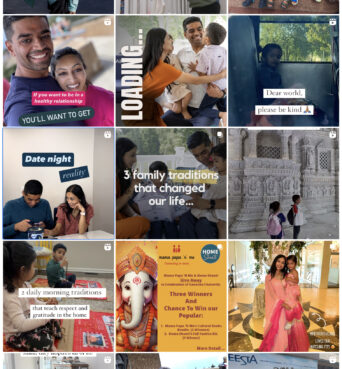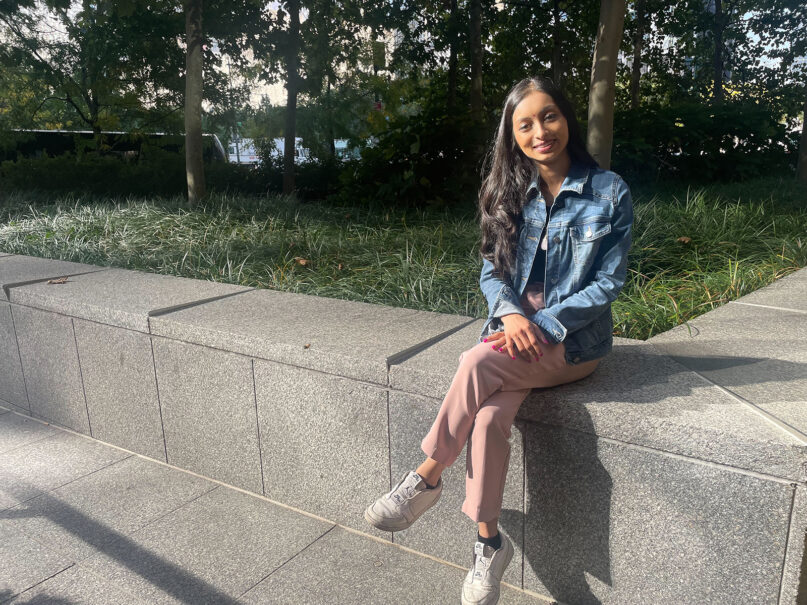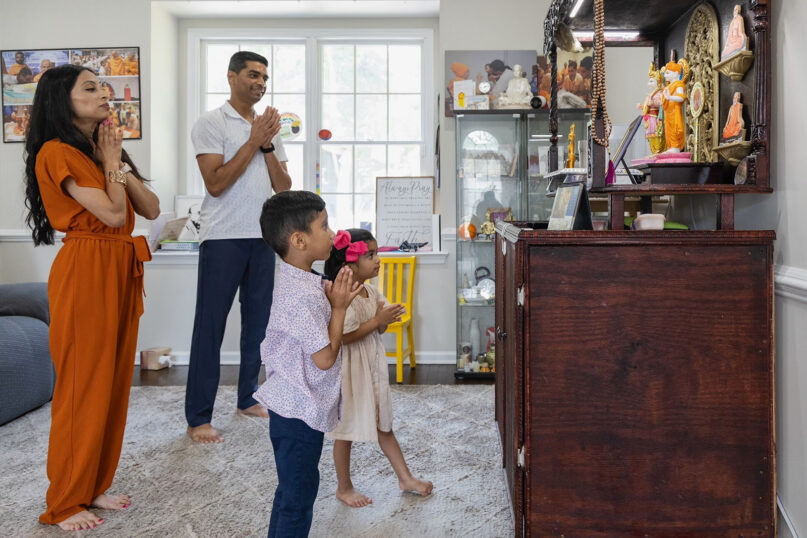(RNS) — Three years ago, as she scrolled through an Instagram feed saturated with viral child psychologists and so-called Christian ‘momfluencers,’ Niki Patel came across the account of “Dr. Becky,” the psychologist and Instagram-famous “conscious parenting” coach with nearly 3 million followers who preaches the importance of mindfulness, gratitude and affirmations within parent-child relationships.
“I’m like, ‘This is what we learn in Hinduism,’” said Patel, 36, a pharmacist and mother of two in New Jersey. “This is literally how we try to teach our kids, like, certain values.”
That’s when Patel saw her niche: Switching her private account to public, Patel began her personal journey of seva, or service, as a Hindu spirituality and parenting content creator.
Today, she shares tips with her more than 30,000 followers on how to calm restless toddlers by chanting mantras and offers ancient wisdom from swamis and gurus about the crucial role mothers play. Patel’s posts are drawn from her daily life as an American mom but with an eye to making “modern-day” parenting, she said, compatible with a faithful Hindu lifestyle.

A variety of recent Instagram posts by Niki Patel. (Screen grab)
“In American culture, you talk about parenting values, and in our culture, we talk about sanskars (virtues) — respecting each other, respecting parents. I feel like there are a lot of opportunities for women to help raise the next generation.”
Patel doesn’t consider herself more than typically religious. “I’m trying to raise our kids with some sense of spirituality, but I don’t expect them to be, like, super-religious or anything,” she said. “I just find that this is very valuable to a person’s life, like it can bring a lot of benefits.”
Being “spiritual but not religious” describes many American millennials and zoomers, a trend that is obvious from her Instagram audience. She recalls a message she received from a college student who said she was inspired to go to class wearing a bindi — the adornment some Hindus affix to their foreheads — after seeing Patel’s own bindi. It shows that taking the risk of “oversharing” one’s personal spirituality can have positive effects.
Patel’s most recent project, Home Shanti, exemplifies her New Age approach to Hindu family life. The Home Shanti Family Meeting Guide is designed to give families a method of discussing festivals, gurus and Hindu mythology while building communication skills.
“If you don’t have peace in your home, then you’re not going to have peace in your life,” she said. “Especially now, with young kids, I know so many parents that are going through so many challenges in their own home, and it’s hard, it’s really hard. How can you, like, lean on our culture and sanskars to kind of get through that?”
Part of her mission, Patel said, is to combat the “disconnect” she sees between immigrant parents and younger Hindu Americans. “We need to make sure they grow up knowing what’s the meaning behind these festivals and not repeat what our parents did, like, ‘Let’s just do puja, let just do aarti,’” referring to Hindu rituals. “There is a deeper meaning, and it’s a spiritual meaning. That’s what our Sanskrit culture teaches us.”
Patel says her focus on intergenerational connection comes from her own lived experience. After marrying her high-school AIM crush, Manan, in 2013, Patel moved in with him and his parents, a common setup in Indian and diaspora culture.
She and Manan were one of the first couples married at the BAPS mandir in Robbinsville, New Jersey, the largest Hindu temple in the United States. They have since moved near the town to fulfill Patel’s dream of raising Shanti, 3, and Samp, 5, in and around the mandir that shaped her own devotion. (The BAPS sect — short for Bochasanwasi Akshar Purushottam Swaminarayan Sanstha — emphasizes the tenet of service to the community.)

Niki Patel poses in New York. (RNS photo/Richa Karmarkar)
Her kids, she said, were inspired by her faith and her gurus who saw her through discord with her in-laws and the traumatic, life-threatening birth of her second child, including guru Mahant Swami Maharaj, the current BAPS spiritual leader, who communicated with her family in the hospital. Her son’s name, Samp, means unity, and Shanti translates to “peace.”
“One of his main messages has always been about fostering unity, not just with your work colleagues, but your family. Unity starts with you. To try to maintain unity within your family means you might have to sacrifice, you might have to tolerate. Where there is samp, there is shanti,” said Patel.
During Patel’s own childhood in the 1990s, morning pujas and evening aartis played constantly in her house. Religion was vital to her parents, who owned a convenience store. Her father is a follower of the Swaminarayan faith, and her mother is a devotee of Santram Maharaj, a Hindu saint. Whenever she and her mother went clothes shopping, Patel recalled, they would “offer it to God before we used it ourselves.”
“Even while she was working at the store for 14 hours — a hard immigrant job, right? — she always had, like, the (devotional hymn) “Hanuman Chalisa” playing. All the customers would come and they would be listening to, like, some mantra or some bhajan,” Patel said.
With her parents working most of the day, Patel and her three siblings were raised by her grandparents, whose positive presence shifted Patel’s view on Hinduism. “You could see how it played out in the real world, you know, that kind of spirituality. It was infused in their mindset of, like, how I should handle anger or how I should handle financial challenges, or, like, what is my purpose in life?” she said.

Niki Patel, left, with her family in New Jersey. (Photo by Sarina Zaparde Photography/@seenbysari)
By the time Patel reached high school, the family had moved from a town where she “felt left out” for not knowing any American music to a new city where the majority of students looked like her and the local school sponsored Indian cultural events. Visits to the mandir fostered an even greater connection to her Indian and Hindu identities. A youth pilgrimage to India in 2003, led by her spiritual leader Pramukh Swami Maharaj, was “pivotal,” she said, to her rejecting the pressure of being an American teen and resisting party culture, TV and “bad books” and drew her closer to what she believed.
“My dada (grandfather) would always tell me that, ‘we have Bhagwan. We have God,’ like, ‘don’t worry about what other people think. You should care what God thinks of you.’”
This can be a kind of armor for young people, she believes. “Everything on social media is about likes and, you know, kind of all about you in a way,” she said. “And in our dharma, it’s more about serving others and being humble and doing the right thing. I feel like I have to really work hard to balance that in my personal life. But I feel like, for me, it’s a seva, it’s a service, and I try to think of it that way.”














